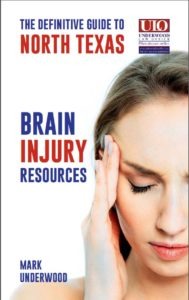
In North TX, brain injuries are often tragic. They can lead to lifelong changes in mental and physical functioning. Sadly, many brain injuries in North Texas result from accidents we cannot predict like car accidents, falls, and violent assaults. Few of us, want to think about life with a brain injury.
As a personal injury attorney, I have seen my share of brain injuries and the lifestyle changes that follow. If you or a loved one are struggling with a brain injury, there are a few things you should know:
- Brain injuries are not congenital or hereditary.
- Most brain injuries are caused by falls, car accidents, sports injuries, or violence.
- An injury in the brain can affect multiple organ systems and bodily functions.
- Emergency rooms often fail to diagnose mild or moderate brain injuries.
- There are national, state, and local resources for victims of brain injury in North Texas.
In this article, we will answer the most common questions we receive about brain injuries. To kick things off, let’s start by defining what constitutes a brain injury.
1. What is a Brain Injury?
The term, “brain injury” sounds self-explanatory. However, its definition is often more complicated than most people think. A brain injury, or a traumatic brain injury (TBI), is a disruption to the brain’s normal functions that occurs after birth. Brain injuries are not congenital, degenerative, or hereditary. To most, the difference between a brain injury, congenital brain abnormality, degenerative diseases, and hereditary defects is not always clear.
Here is a chart to illustrate the differences (and highlight common examples) of each type of brain malfunction:
| Type of Brain Abnormality | Definition | Common Example |
| Brain Injury | A disruption to normal brain functions. It occurs after birth. Often. it is caused by an external factor or internal disruption, like loss of oxygen. | Concussion |
| Congenital Brain Abnormality | A brain abnormality present at birth. | Anencephaly |
| Degenerative Brain Disease | A disease that causes the brain to deteriorate over time through the decline and death of nerve cells. | Alzheimer’s disease |
| Hereditary Brain Defect | Brain damage or deterioration caused by a genetic mutation passed down through a family (hereditary). | Tay-Sachs disease |
You will notice that the brain abnormalities mostly differ based on cause of injury and age of onset.
For a free legal consultation, call (972) 535-6377
2. How do Brain Injuries Happen?
Anytime one talks about the brain, the conversation can get complicated quickly.
There are two types of brain injury: traumatic brain injury (TBI) and acquired brain injury (ABI). The key difference between the two types of injuries is how they occur. TBIs are caused by an outside force, like a hard blow to the head. ABIs are caused by a disruption in normal bodily processes, like a lack of oxygen.
Traumatic brain injuries are often caused by falls, car accidents, sports injuries, and violence (child abuse, domestic violence, etc.).
Acquired brain injuries are often the result of a stroke, prolonged choking, seizure, toxic exposure (like carbon monoxide or lead poisoning) or electrical shocks.
3. Why do Emergency Rooms Fail to Diagnose Brain Injuries in North Texas?
A 2008 medical study on the Accuracy of Mild Traumatic Brain Injury Diagnosis found that 56% of patients who sustained a mild TBI were not diagnosed in the emergency room. Many emergency departments are overburdened with patients. Suspected TBIs account for a decent portion of emergency room visits. Physicians are often forced to make a quick decision in the emergency room, with limitations in diagnosing TBI. Plus, some symptoms of brain injuries do not appear immediately. Follow-up appointments are essential to diagnosing a brain injury.
Recent medical studies have shown that both the standard clinical interview and CT scans have limited sensitivity for diagnosing brain injuries. This means many patients that do not receive a brain injury diagnosis in the emergency room actually have a brain injury.
Click to contact our personal injury lawyers today
4. How do I Know if I Have a Brain Injury?
All North, TX brain injuries should be taken seriously. It’s hard to spot the symptoms of a brain injury if you did not witness the cause of the injury. Our brain is our control center. A brain injury can impede our ability to breathe even with healthy lungs. Our brains can impede our ability to speak, walk, or perform basic daily functions. Let’s face it, our brains and hearts are (arguably) our must important organs. Without either, we cannot function.
As you might imagine, an injury to the brain can lead to malfunctions in virtually every other organ system. Symptoms of a brain injury are as varied as the systems and functions that the brain controls.
Individuals with a brain injury might experience nausea or vomiting, headaches, drowsiness and difficulty speaking or balancing.
Other symptoms include a loss of consciousness, difficulty sleeping, mood changes, and memory problems. More serious brain injuries may cause pupil dilation, drainage of clear fluid from the nose or ears, and numbness in fingers and toes.
Complete a Free Case Evaluation form now
5. What Should You Do if You Believe You Have a Brain Injury?
If you suspect you or a loved one have a brain injury, call a doctor. A North TX brain injury doctor can determine if you need emergency medical treatment or if you can treat the symptoms at home.
At a minimum, rest and don’t drive or operate machinery. You should not be alone for at least 24 hours. There is a risk you could lose consciousness. You may need urgent medical attention.
Other recommendations include resting, avoiding screen time and staying hydrated. The blue light from tv and computer screens can worsen symptoms. Briefly, you want to take care of your body, rest, and keep track of any worsening or new symptoms.
6. What Problems do Brain Injuries Cause?
Brain injuries can cause long-term problems like depression, irritability, memory loss and dizziness. Severe brain injuries can lead to lifelong debilitating problems. Besides cognitive and behavioral problems, individuals that have experienced a severe brain injury typically have physical disabilities.
A victim of brain injury may experience the following cognitive and behavioral impairments:
- Difficulty deciding and processing information;
- Trouble understanding others and expressing oneself;
- Shortened attention span and memory loss;
- Impatience, irritability, and a reduced tolerance for stress;
- Increased aggressiveness.
Some of the long-term physical problems associated with brain injury are:
- Changes in hearing, vision, and sense of touch;
- Disorientation and difficulty with balance and coordination;
- Changes to smell and taste;
- Increased sensitivity to pain;
- Extreme fatigue and/or sleep disorders;
- Paralysis and/or weakness;
- Seizures and tremors;
- Sensitivity to light.
Trauma to the brain can disrupt many bodily systems and processes we take for granted. Victims of severe brain injury often require lifelong medical assistance and struggle with independence. Long-term care is costly. Because of the cost of long term care, brain injury victims may need money to pay for needed care.
What’s the Definitive Guide to North Texas Brain Injury Resources?
If you or a family member in North TX experience a brain injury do not have to struggle alone. The Texas Department of Health and Human Services has provided a comprehensive Brain Injury Resource Guide to help people living with a brain injury find the support they need. The Guide lists where you can find long-term care services, financial help, and rehabilitation services among a host of other resources.
Another great nationwide resource for those living with brain injury, is the Brain Injury Association of America (BIA). They have compiled a Texas Resource Directory for information specific to Texas residents. The BIA’s resource directory provides an even lengthier list of resources (including lists that are state-specific and nationwide).
I have created “The Definitive Guide to North Texas Brain Injury Resources.” The book is full of information specific to North Texas residents and their families. As a personal injury attorney, I have represented victims of brain injury and know just how life-changing these injuries can be. Victims aren’t only affected by the physical symptoms of brain injuries – virtually every aspect of an individual’s life can be changed by an injury.
Where Can People Get More Info About Brain Injuries in North Texas?
At Underwood Law Office, we stand up for victims of traumatic injuries, including brain injuries. If you or a loved one has been diagnosed with or is experiencing symptoms of a traumatic brain injury, we can help. For instance, we can recommend resources and determine if you have a personal injury claim.
To learn more, check out our Definitive Guide to North Texas Brain Injury Resources or contact us for a free copy today.
Call or text (972) 535-6377 or complete a Free Case Evaluation form




